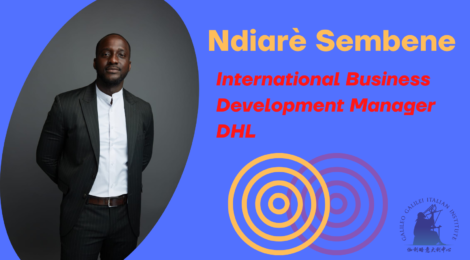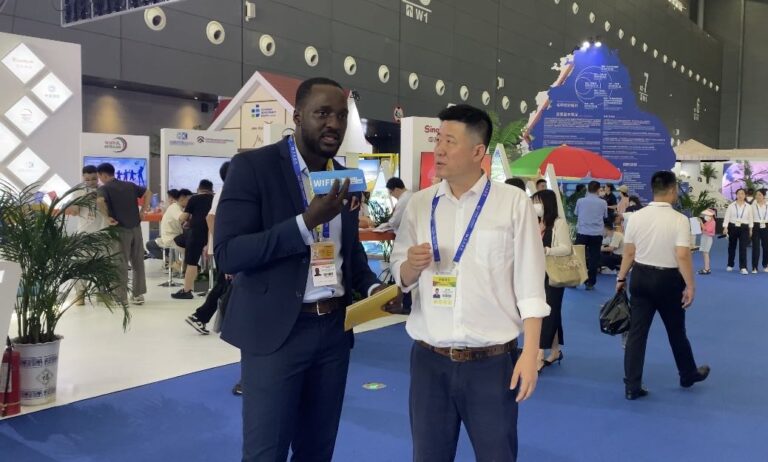
Circle of Friends – Interview with Ndiarè Sembene
Ndiarè Sembene is a young African Entrepreneur who speaks fluently English , French, Mandarin and Wolof and aiming to become an international expert in logistics between China and Africa. He did a master of finance in Mandarin at Liaoning University in China and this journey truly opened his eyes about what a human being can achieve as an entrepreneur as long as you remain positive and resilient. On top of being an entrepreneur, he is a GYBP Alumni , a Google Student Ambassador Alumni and an Aiesec Alumni.
We bring you his story of success between China and Africa, enjoy it!
1. PERSONAL RELATIONSHIP WITH CHINA
How did your experience with China begin?
Was it a casual meeting, related to your work, for pleasure?My first experience with China began in 2014 when I arrived in Shenyang, Liaoning province to pursue my Master of Finance at Liaoning University. During that time, I was fortunate enough to receive a Scholarship from the government.
How has your relationship with China evolved over time? Have you been based in the country or you have been traveling from Africa to China often? Which city did you choose in particular to start your Chinese experience? And why?
My relationship with China has evolved significantly over time. I lived in Shenyang for a little more than three years. At some point, I had to go to Belgium for work for a year and a half, but I eventually returned to China. Later, I traveled to Africa for work and have been back in China since 2022. Over the past 10 years, I have maintained direct contact with the country through both my professional and social life. With my current role based in China, I frequently travel to Africa.
I began my Chinese experience in Shenyang because I chose to pursue my Master’s degree entirely in Mandarin, and Liaoning University seemed to be one of the best options.
What has your experience in this country taught you at a personal level?
The population of my entire country is equivalent to that of a single city in China, which has encouraged me to think and envision on a larger scale. On a personal level, this experience has taught me how to be more structured in both my work and business endeavors. It has also helped me understand that entrepreneurship and innovation require time, but with the right team, many things can be accomplished.

2. BUSINESS IN CHINA AND WITH CHINA
Tell us about your business experience in China. What is your role and what are the main results you have achieved over the years?
My current role is International Business Development Manager for DHL Global Forwarding China, a business unit of the DHL Group. In this capacity, I act as a bridge to connect shipping needs and solutions between the Middle East- Africa region and China in terms of logistics. One of our most significant achievements has been, and continues to be, unlocking the potential in logistics for both Africa and China through our dedicated team and extensive network.
This role offers a unique solution to the market by providing access to local knowledge of the African logistics industry, combined with our international network to ensure global reach. In essence, we deliver a global reach with a local touch.
In which sector is your company active? Which type of company is that? In which city are you based? And in which Chinese regional markets are you present?
DHL operates in the logistics and transportation sector. Our company is a major player in the logistics industry and is known as one of the dominant leaders in the market. I used to be based in Shanghai, but now I am in Guangzhou, where I am focused on supporting growth in the Middle East and Africa market.
How has China changed compared to its early years from a business perspective in your specific sector? What are the differences that most affected you positively and negatively?
China is rapidly adapting to the African market, especially in Sub-Saharan Africa. Initially, China was not as actively involved in trade compared to its European and American counterparts. However, over the past 10-20 years, there has been a noticeable increase in interest. China now seeks to better understand the market and streamline business operations in Africa to enhance the value chain.
The growing interest from foreign investors in China entering the African market is a positive development that is expected to drive economic growth and development.
However, there are challenges as well. The compliance of some of the transactions is not always well-structured, which can potentially lead to issues that might impact the expected economic outcomes of investments.

How important is it to know the local culture and language in your business?
Understanding the local culture and language is crucial when engaging with China, especially in the freight forwarding industry. Effective communication with customers and suppliers is key to streamlining operations on both sides. Being able to communicate directly in the local language can greatly facilitate interactions. Many suppliers in China, despite being involved in international trade, may not feel confident speaking English, though they may be comfortable typing it. Productivity can be enhanced through motivation, and having an understanding of someone’s culture can make it easier to motivate them and maintain their motivation.
Have you noticed any changes in recent years compared to your arrival from a work point of view? If so, what were the most significant?
It is essential to recognize that the southern region of China has had long-standing trading connections with the Middle East and Africa since early times, in contrast to North or Central China. One significant change I have noticed over the years is the increasing number of Chinese investors and entrepreneurs venturing into Africa. In regions such as East, West, and Central Africa, even in remote rural areas, it has become common to come across Chinese factories or businessmen who have established their own companies. They manufacture various goods, including fast-moving consumer goods, for the local market or for export to neighboring countries.
For instance, some of the largest tile brands are now producing directly in Africa and selling locally, which significantly reduces production costs by avoiding fluctuations in shipping rates and reducing delivery times as the products are locally sourced. This trend of local production is also observed in many other industries.
How did the pandemic affect your business and what strategies have you implemented since its outbreak to respond to the crisis?
The shipping industry was significantly impacted by the pandemic, as it introduced a challenging wave due to the prevalent manual processes involved in loading containers at ports or ground handling at airports. The reliance on human capital has been negatively affected, resulting in a ripple effect on the speed of loading and ultimately impacting our ability to serve customers efficiently.
On the other hand, during the pandemic, there was a critical need for urgent supplies, with logistics playing a key role in ensuring essential goods were delivered promptly from point A to point B to improve lives. Fortunately, we prioritized the well-being of our employees and had anticipated such scenarios by implementing contingency plans to ensure business continuity across the globe. This included allowing employees to work flexibly from home while ensuring all health measures were adhered to.
What are the main challenges you have encountered in your experience as a successful manager in China? What are the positive surprises?
I endeavor to have a positive outlook on every situation I encounter. Therefore, I see challenges as opportunities and even thrive in their settings. I believe that there’s always a solution, people who can help, something to learn and room to grow.
How important is the role of technology in your business? From this point of view, is it an advantage for your company to be able to operate in China?
Technology plays a crucial role in our business. To thrive and survive in today’s competitive landscape, it is essential to embrace innovation. As part of our 2025 strategy, one of our major investment areas is focused on creating a truly digital working environment . We have made significant investments to ensure that the majority of our processes are digitized, with efficiency being a top priority. The aggressive nature of the Chinese market serves as an advantage for us, driving innovation and the digitalization of all our operations.
Are you also active in Africa? Or only in China?
Yes, we are active in Africa.

3. GOING EAST
Why does being in China make sense for an African manager/entrepreneur?
For an African manager and entrepreneur, being in China holds strategic value due to China being Africa’s largest trading partner. The trade relationship between the two regions often results in a trade deficit, with a significant portion of fast-moving consumer goods, machinery, equipment, and construction materials being imported from China, while primarily natural resources and raw materials are exported from Africa to China.
As an intermediary, you would find yourself in a thriving trade environment where there is a constant demand for products from China. Additionally, there is a growing trend of Chinese manufacturers establishing factories in Africa, presenting opportunities for local manufacturing. Moreover, there are substantial opportunities in trading natural resources and materials between the two regions.
Are you already present in Chongqing or in the Chengdu-Chongqing economic circle?
Yes, we have offices in Chengdu and Chongqing, with a total of 50 offices or sales points across China.
Interview by Marco Bonaglia



